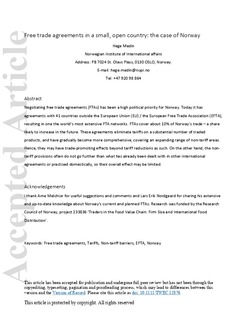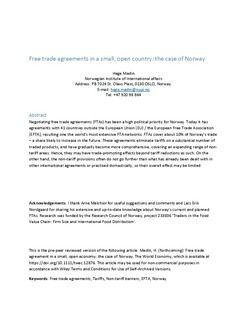| dc.contributor.author | Medin, Hege | |
| dc.date.accessioned | 2020-01-21T17:35:54Z | |
| dc.date.available | 2020-01-21T17:35:54Z | |
| dc.date.created | 2019-11-19T14:07:01Z | |
| dc.date.issued | 2019 | |
| dc.identifier.issn | 0378-5920 | |
| dc.identifier.uri | http://hdl.handle.net/11250/2637339 | |
| dc.description.abstract | Negotiating free trade agreements (FTAs) has been a high political priority for Norway. Today it has agreements with 41 countries outside the European Union (EU) / the European Free Trade Association (EFTA), resulting one the world’s most extensive FTA networks. FTAs cover about 10% of Norway’s trade – a share likely to increase in the future. These agreements eliminate tariffs on a substantial number of traded products, and have gradually become more comprehensive, covering an expanding range of non-tariff areas. Hence, they may have trade-promoting effects beyond tariff reductions as such. On the other hand, the non-tariff provisions often do not go further than what has already been dealt with in other international agreements or practised domestically, so their overall effect may be limited. | |
| dc.description.abstract | Free trade agreements in a small, open country: The case of Norway | |
| dc.language.iso | eng | nb_NO |
| dc.subject | Handel | |
| dc.subject | Trade | |
| dc.title | Free trade agreements in a small, open country: The case of Norway | nb_NO |
| dc.type | Journal article | nb_NO |
| dc.type | Peer reviewed | nb_NO |
| dc.description.version | submittedVersion | |
| dc.description.version | acceptedVersion | |
| dc.subject.nsi | VDP::Internasjonal politikk: 243 | |
| dc.subject.nsi | VDP::International politics: 243 | |
| dc.source.journal | The World Economy | nb_NO |
| dc.identifier.doi | 10.1111/twec.12876 | |
| dc.identifier.cristin | 1749478 | |
| dc.relation.project | Norges forskningsråd: 233836 | nb_NO |
| cristin.ispublished | true | |
| cristin.fulltext | preprint | |
| cristin.fulltext | postprint | |
| cristin.qualitycode | 1 | |

